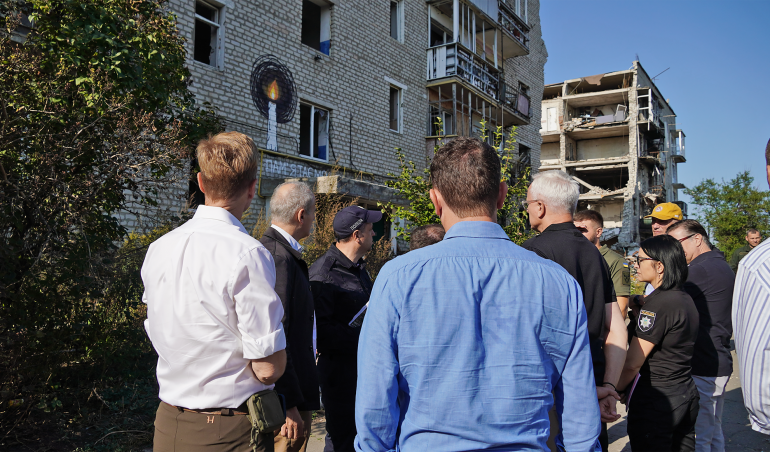Resilience and Renewal: EU Mission of Support to Ukraine
October 06, 2023
A high-level EU delegation, comprising the Service for Foreign Policy Instruments (FPI) and the EU Advisory Mission (EUAM) Ukraine, recently visited the Kharkiv region.
Their primary objective was to evaluate how the EU can provide essential support to Ukraine, with a particular focus on the country’s liberated territories. During their visit, Peter Wagner, FPI Director, and Rolf Holmboe, EUAM’s Head, engaged with local authorities and senior law enforcement officials from the Kharkiv region and the city of Izium.
Horrors of the occupation
Having visited this place once, its memory lingers forever. The crosses marking mass burial sites in Izium, Kharkiv region, are indelibly engraved in one’s mind. Each of these crosses symbolises the tragedy of an individual who did not survive Russia’s temporary control of the town. Behind every cross lies the story of a family that survived the occupation but lost their loved ones and friends. Here lies a grave, concealing an entire family of five people. A bit further away is the site where Russian occupiers callously left 17 Ukrainian soldiers’ bodies beneath a buried tank, booby-trapped to harm anyone attempting to take them out.
“Don’t go behind the white ribbons; it could be perilous. Mines may still be lurking here,” warns Dmytro Hrinchak, Head of the Izium District Police Department. He now welcomes European guests to his city, but this time he leads them to a place where the soul shatters upon grasping the horrors hidden beneath each cross-marked grave.
The only bright spot in this sombre landscape is the memorial baskets beneath the pine trees, a few lamps and an empty coffin that, like an invisible bridge, connect the exterminated victims with the sorrow of those living today. Only a just trial for the war criminals can bring peace to the souls of the slain and their loved ones.
Oksana Oliynyk, one of the Kharkiv region’s National Police officials tasked with investigating war crimes in the area, shares information about recent developments on the matter. To provide a more vivid perspective, she presents the most crucial cases from her files to the visitors. They are deeply impressed by the magnitude and scale of the horrors that this petite woman and her colleagues confront on a daily basis.
“We will never forget what we witnessed here and we will continue supporting Ukraine in its communities in their battle for freedom and justice,” remarks Peter Wagner, visiting Izium for the first time to assess how the European Union can aid Ukraine, especially in the liberated territories.
‘Butterflies’ that kill
While the enemy was expelled, the “surprises” from their presence in the Kharkiv region will haunt the locals for years to come. More than a third of the Kharkiv region’s territory was under occupation. Post-liberation, this entire area resembles a minefield, where local residents, even after de-occupation, sometimes fall victim to the remnants of war.
One of the areas where the EU is supporting Ukraine is demining. The scale is immense, and the challenges are extraordinary. Mines are not confined to forests and cemeteries; they infest parks and schools. Every inch of the formerly occupied cities must be meticulously examined, demanding substantial resources, both human and technical.
Deputy Head of the Kharkiv Regional Military Administration, Yevhen Ivanov, highlights another issue: demining agricultural lands in the region. As of now, more than 570,000 hectares remain uncleared, hampering the region’s ability to restore its economic capacity to pre-war levels.
“I personally found 25 mine ‘butterflies’ in my yard. Such ‘surprises’ from the occupiers can be found in every yard,” shares Izium Mayor Valeriy Marchenko during a meeting with the delegation. He expresses gratitude to the European partners for their attention to the residents of Izium. He also acknowledges the assistance in reconstructing critical infrastructure within the city. People are gradually returning, and the city is coming to life again. Yet, there are scarcely any children in the streets. This is not surprising, as the entire city has only one school equipped with an elementary shelter: Lyceum No. 11, which reconstruction became possible through EU financial support.
Supporting revival
The EU is assessing the needs of Ukrainians, partly through the activities of EUAM Ukraine in the region. Rolf Holmboe highlights the Mission’s role as a reliable partner in aiding Ukrainian law enforcement agencies. The Mission provides training for local police officers and prosecutors and delivers essential equipment to law enforcers in Izium.
Izium is part of the EUAM’s pilot project, designed to assist local law enforcement agencies, which lost everything due to shelling and the Russian occupation. The Mission has already provided IT and communication equipment for police and prosecutors in Izium, significantly enhancing their working conditions and efficiency.
“We will intensify our support to the local authorities across liberated territories. This commitment also extends to areas yet to be liberated in the future,” the Head of Mission emphasises.
Peter Wagner, profoundly moved by the scale of destruction in Izium, expresses his admiration for the resilience of the local population. He notes the inspiring initiatives aimed at rebuilding lives and homes and pledges to continue supporting them.
During their visit, the EU delegation once again witnessed the unwavering determination of Ukrainians to rebuild their country. The European Union remains steadfast in its support for Ukraine on its challenging path to recovery, with the ultimate goal of EU membership.
























































